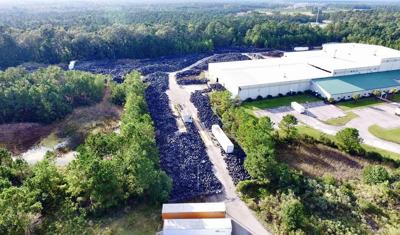A new law spurred by The Post and Courier's reports on a dangerous tire dump near Moncks Corner is designed to crack down on waste tire recyclers who violate state regulations, with potential jail terms for the worst offenders.
Gov. Henry McMaster signed the legislation May 17, making violations of waste tire rules and permits a misdemeanor, punishable with a fine up to $10,000 a day for the first time and up to $25,000 per day for the second and succeeding violations. The law also calls for a possible jail term of up to one year for violators.
State Rep. Sylleste Davis, a Republican representing Berkeley County, said she introduced the legislation in response to news reports about Viva Recycling, which abandoned more than 1 million scrap tires near a neighborhood off Cypress Gardens Road.
The company's owner walked away from the plant after running out of money, and the state spent nearly $3.3 million to clean up the site, which was deemed a fire and health hazard.
Davis said the newspaper's reporting "pointed out the problems with the waste tire industry and how the people of South Carolina, and, in that particular instance, the people of Berkeley County could be taken advantage of."
She added the new law "will stop the bad actors in the business well before 1 million tires accumulate, as well as the associated fines and fees."
In addition to sticking South Carolina with the cleanup bill, Viva never paid about $1.7 million in civil fines and penalties to the state Department of Health and Environmental Control.
The new law also gives DHEC more power to shut down rogue tire recyclers before the problems grows out of control. The agency can suspend a recycler's business as soon as its permitted capacity is exceeded, giving the business up to seven days to reduce the number of tires on its site. If that doesn't happen, DHEC can eventually suspend the permit until the recycler gets its tire volume to 80 percent of capacity or below.
The law "gives DHEC authority it previously lacked to revoke, suspend and deny permits for waste tire recyclers violating the law when they exceed permissible capacity," state Rep. Bill Chumley, R-Spartanburg County, said during a committee hearing.
Previously, DHEC could issue sanctions but the recyclers could appeal the matter to the S.C. Administrative Law Court and tie up a final resolution for months or longer.
The newspaper's report, called “Tire Failure,” exposed how lax state oversight and corporate missteps fueled the rise of massive tire piles in Moncks Corner, Anderson and Jacksonville, Fla.
It documented how Viva executives had a string of bankruptcies in the Northeast before launching their tire-recycling projects in South Carolina. Despite those failures, state and local officials aided their entry into South Carolina by approving $16 million in tax-exempt bonds.
Viva opened its Berkeley County site in 2013 and ran into trouble with regulators two years later for improper storage of tires and other violations. The problems, and the piles of tires, grew bigger and DHEC ultimately revoked the company’s operating permit in 2017.
In addition to being a nuisance located at the entrance of the Fairmont South subdivision, residents of the neighborhood complained of swarms of mosquitoes breeding in stagnant water within the abandoned tires. A second abandoned Viva plant in Anderson County has been the site of several fires and the state is spending $2 million to clean up that location.











